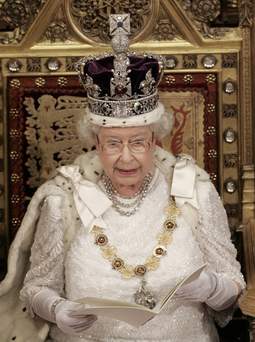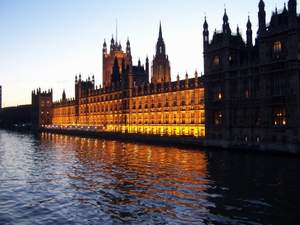 2009 Queen’s Speech
2009 Queen’s Speech
by Marianne Overton, LincsMag Writer.
Date: 3 December 2009
2009/10 Legislative Programme - Published 18 November

Background
On 29 June 2009, the Government published a major policy document, Building Britain's Future, alongside its draft legislative programme for 2009/10 parliamentary session. The 2009/10 Draft Legislative Programme and Queen’s Speech, which included 11 bills, was put out for consultation. Responses were requested by 21 September 2009.
2009 Queen’s Speech
As part of the State Opening of Parliament and the beginning of the parliamentary year, the Queen delivered her speech and the 2009/10 Legislative Programme on 18 November. The speech outlines the legislative programme for the next 12 months - or, in this case, until Parliament dissolves for the next general election. The election must take place by 3 June however many reports are predicting 6 May as the most likely date when local elections are held in England.
With the shorter parliamentary period, the slimmer programme contains 13 bills and 2 draft bills. Nevertheless reports still consider there to be too little time to complete the parliamentary business. However, Commons leader Harriet Harman has said "most" of the proposed bills - which also include legal guarantees for the health service and education - will be passed before the next election.
Legislative Programme
Section One: Bills
Fiscal Responsibility Bill - Provides a "firm and binding statutory basis" for the government's promise to halve its budget deficit within four years. Gives Parliament power to approve medium-term fiscal plans. In an interview, Lord Mandelson explained details of how Government plan to halve the budget deficit will be revealed in next month's pre-Budget report.
Child Poverty Bill - Puts into law the government's commitment to end child poverty by 2020. Duty on all local authorities to deal with the problem. Ensures the government must make annual reports to Parliament on the success of its strategies to end child poverty.
Children, Schools and Families Bill - Offers pupil and parent guarantees for standards of education. Schools to be given "report cards". Promises "greater flexibility" for primary schools to set their own curriculums. Also ensures that all young people receive at least one year of sex and relationships education. Home educators will have to be registered and inspected. A review of the publication of family proceedings in court. Whole bill applies to England. Other parts cover Wales and extends in part to Northern Ireland.
Personal Care at Home Bill - Guarantees free personal care for the 280,000 people with the "highest needs", such as those with serious dementia or Parkinson's disease. Protects the savings of the 166,000 people who currently get free care, saving them from having to pay future charges. Promises to help 130,000 people needing to enter care homes for the first time to "regain their independence". Offers adaptations to the neediest people's homes to increase their independence.
Crime and Security Bill - Reduces the amount of information police need to record when carrying out stop and search. Gives police the power to bar suspected domestic violence offenders from their homes for a period, even when not charged. Brings in a legal requirement to store air guns safely. Introduces compulsory licensing for all wheel-clamping businesses. DNA records of adults who are arrested but not charged are to be held on database for six years. Allows police to take DNA samples and fingerprints of sexual and seriously violent offenders returning to UK following conviction overseas.
Flood and Water Management Bill - Gives local authorities the responsibility to deal with surface water flooding. Sustainable drainage systems will have to be considered for new building developments. Says the safety of communities near reservoirs must be improved, via risk-based regulation. Gives water companies more power to control customers' usage during droughts.
Equality Bill - Gives the whole public sector a duty to "narrow the gap between rich and poor". Business with more than 250 employees will have to report on gender differences on pay. Public bodies should use £200bn of public procurement deals at their disposal to "drive equality" in private sector firms.
Financial Services Bill - Establishes a Council for Financial Stability, chaired by the chancellor, and comprising Treasury, Bank of England and Financial Services Authority (FSA). Strengthens the FSA to take "action" on pay of those in financial services, following the recent outcry over bonuses.
Bribery Bill - Makes it an offence to bribe foreign officials and for business to fail to prevent bribery.
Cluster Munitions (Prohibitions) Bill - Makes it an offence to use, produce, develop, acquire, stockpile, retain or transfer cluster munitions.
Constitutional Reform and Governance Bill - Creates basis in law for Parliament to scrutinise treaties. Ends the by-election of hereditary peers to sit in House of Lords.
Digital Economy Bill - Gives media regulator Ofcom the duty to assess the UK's communications infrastructure every two years. Updates regulations to make the digital radio switchover possible by 2015.
Energy Bill - Sets rules for energy firms to provide support for poorer customers, with regulator Ofgem having a duty to "proactively" protect them. Supports the construction of up to four carbon capture and storage schemes to cut pollution.

Section Two: Draft Bills
House of Lords Reform Bill - Promises that the Lords will be between 80% and 100% elected. States the government should not hold a majority in the second chamber and its members must be independent.
International Development Spending Bill - Requires that 0.7% of gross national income is spent on development from 2013.
Section Three: Bills and Draft Bills Excluded
Bills that featured in the draft legislative programme that have not been included in the final version are as follows:
The draft bills that have not been included are:
More information can be accessed on the Leader of the House of Commons website and BBC Politics.